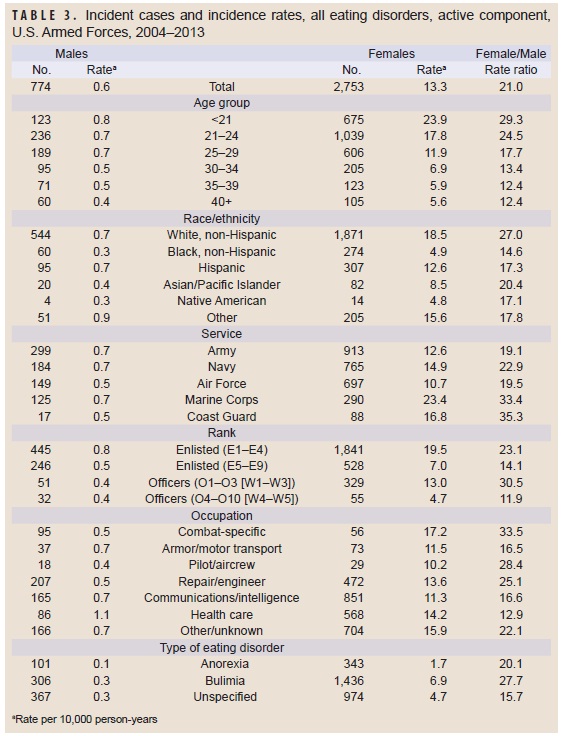By the Numbers - Oct. 6, 2014
3,527
The number of Service members receiving an "incident diagnoses of one of the eating disorders: anorexia nervosa (AN), bulimia nervosa (BN), or 'eating disorder, not otherwise specified" between 2004–2013, according to an article in the September 2014 issue of the Armed Forces Health Surveillance Center's Medical Surveillance Monthly Report -- Diagnoses of Eating Disorders Among Active Component Service Members, U.S. Armed Forces, 2004–2013.
Incidence rates were more than 20 times higher in women than men. Higher rates were found among the younger age groups; white, non- Hispanics; and Marines compared to their respective counterparts. Incidence rates and prevalence of these disorders in service members were lower than estimates from studies of civilian populations and other studies of military populations.
The article pointed out that although "diagnoses of eating disorders are disqualifying from entrance into military service, hundreds of cases are diagnosed in service members each year."
An article in the July-August 2012 issue of the journal Women's Health Issues -- Eating Disorders and Psychiatric Comorbidity among Iraq and Afghanistan Veterans -- indicated that "Rates of eating disorders are significantly higher among returning veterans with comorbid mental health problems compared with those without mental health diagnoses."

"Armed Forces Health Surveillance Center"
3,527
The number of Service members receiving an "incident diagnoses of one of the eating disorders: anorexia nervosa (AN), bulimia nervosa (BN), or 'eating disorder, not otherwise specified" between 2004–2013, according to an article in the September 2014 issue of the Armed Forces Health Surveillance Center's Medical Surveillance Monthly Report -- Diagnoses of Eating Disorders Among Active Component Service Members, U.S. Armed Forces, 2004–2013.
Incidence rates were more than 20 times higher in women than men. Higher rates were found among the younger age groups; white, non- Hispanics; and Marines compared to their respective counterparts. Incidence rates and prevalence of these disorders in service members were lower than estimates from studies of civilian populations and other studies of military populations.
The article pointed out that although "diagnoses of eating disorders are disqualifying from entrance into military service, hundreds of cases are diagnosed in service members each year."
An article in the July-August 2012 issue of the journal Women's Health Issues -- Eating Disorders and Psychiatric Comorbidity among Iraq and Afghanistan Veterans -- indicated that "Rates of eating disorders are significantly higher among returning veterans with comorbid mental health problems compared with those without mental health diagnoses."

"Armed Forces Health Surveillance Center"

